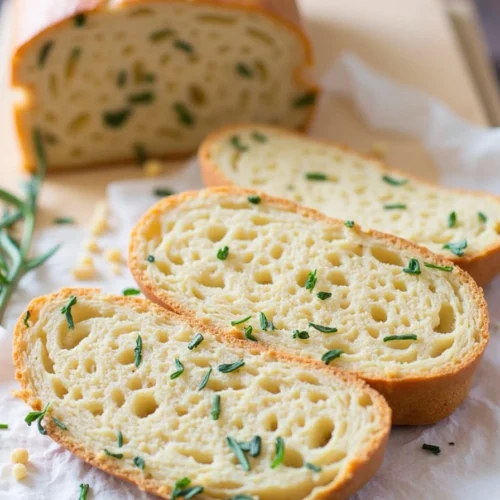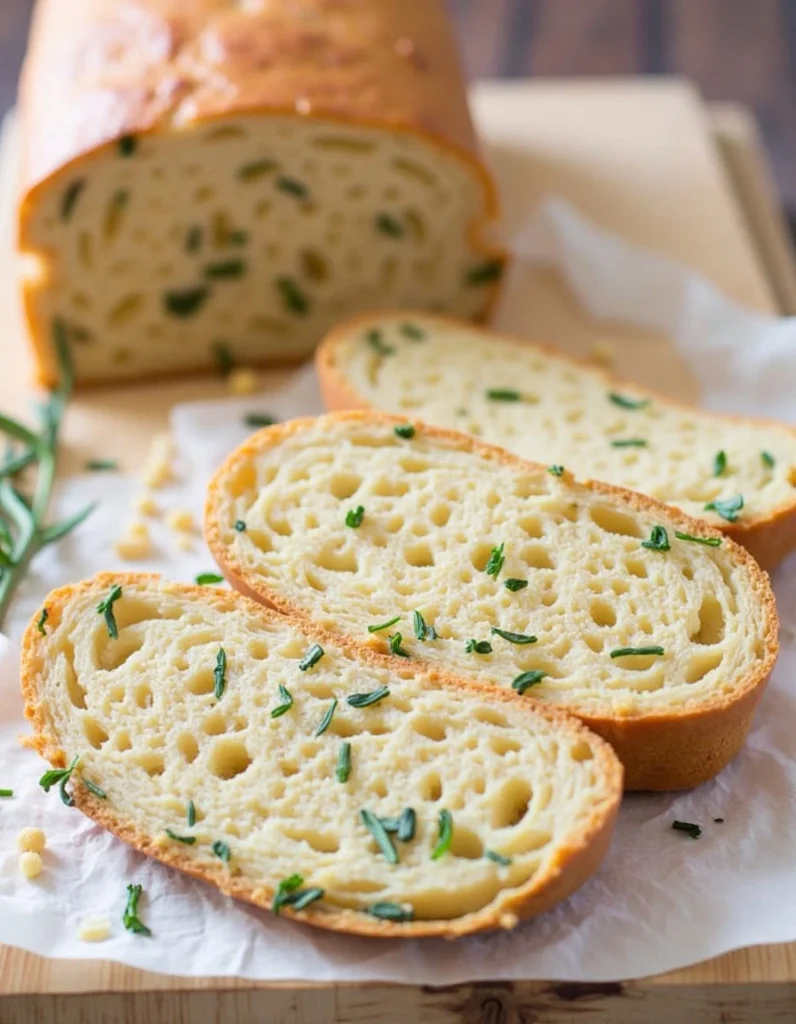Few things are as comforting as the aroma of freshly baked bread wafting through your kitchen. When that bread is infused with the rich, mellow flavor of roasted garlic and the earthy fragrance of rosemary, it becomes truly irresistible. Roasted garlic rosemary bread is the perfect combination of savory and aromatic, offering a crusty exterior and a soft, flavorful crumb that pairs beautifully with soups, salads, or simply a pat of butter.
If you’ve ever wanted to try your hand at homemade bread, this roasted garlic rosemary bread recipe is an excellent place to start. Not only does it fill your home with a delightful scent, but it also yields a loaf that’s both rustic and gourmet. Whether you’re a seasoned baker or a complete beginner, this guide will walk you through every step, from roasting the garlic to shaping and baking your loaf. Let’s dive into the world of homemade bread and discover why roasted garlic rosemary bread deserves a spot in your baking repertoire.
Why Make Roasted Garlic Rosemary Bread?
Roasted garlic rosemary bread is more than just a basic loaf. The process of roasting garlic transforms its sharp, pungent flavor into something sweet, mellow, and buttery. When combined with fresh or dried rosemary, the bread takes on a Mediterranean flair, making it a standout addition to any meal.
This bread is incredibly versatile. Serve it as a side with pasta, use it to make gourmet sandwiches, or toast slices for a savory breakfast. It’s also a fantastic way to impress guests at dinner parties or family gatherings.
Ingredients & Equipment
Ingredients
- Flour: Bread flour is ideal for a chewy crumb, but all-purpose flour works well too.
- Yeast: Active dry yeast or instant yeast.
- Water: Lukewarm, to activate the yeast.
- Salt: Enhances flavor.
- Olive Oil: Adds richness and moisture.
- Roasted Garlic: For sweet, mellow flavor.
- Rosemary: Fresh is best, but dried works in a pinch.
- Sugar or Honey: Optional, to feed the yeast and add a touch of sweetness.
Ingredient Table
| Ingredient | Amount |
| Bread flour | 3 ½ cups |
| Active dry yeast | 2 ¼ tsp (1 packet) |
| Warm water | 1 ½ cups |
| Salt | 2 tsp |
| Olive oil | 2 tbsp |
| Roasted garlic | 1 large bulb |
| Fresh rosemary | 2 tbsp, chopped |
| Sugar or honey | 1 tsp (optional) |
Equipment
- Mixing bowls
- Wooden spoon or dough hook
- Loaf pan or Dutch oven
- Parchment paper
- Kitchen towel or plastic wrap
- Sharp knife or bread lame
How to Roast Garlic?
Step-by-Step Garlic Roasting
- Preheat Oven: Set your oven to 400°F (200°C).
- Prepare Garlic: Slice the top off a bulb of garlic to expose the cloves.
- Drizzle & Wrap: Drizzle with olive oil, wrap in foil.
- Roast: Bake for 35-40 minutes until cloves are soft and golden.
- Cool & Squeeze: Let cool, then squeeze out the roasted cloves.
Roasted garlic can be made ahead and stored in the fridge for up to a week.
Step-by-Step Bread Recipe Instructions
Mixing the Dough
- Activate Yeast: In a large bowl, combine warm water, sugar or honey, and yeast. Let sit for 5-10 minutes until foamy.
- Add Ingredients: Stir in olive oil, salt, chopped rosemary, and roasted garlic (mash the cloves first).
- Add Flour: Gradually add flour, mixing until a shaggy dough forms.
Kneading
- Knead by hand on a floured surface or use a stand mixer with a dough hook for 8-10 minutes, until the dough is smooth and elastic.
First Rise
- Place dough in a lightly oiled bowl, cover, and let rise in a warm place for 1-2 hours, until doubled in size.
Shaping
- Punch down the dough, shape into a round or oval loaf, and place on parchment paper or in a loaf pan.
Second Rise
- Cover and let rise again for 30-45 minutes.
Baking
- Preheat Oven: Heat oven to 425°F (220°C). If using a Dutch oven, place it inside to preheat.
- Score the Loaf: Use a sharp knife to make a few slashes on top.
- Bake: Bake for 25-30 minutes (uncovered if using Dutch oven), until the crust is golden and the loaf sounds hollow when tapped.
- Cool: Let cool on a wire rack before slicing.
Tips for Perfect Bread
Choosing the Right Flour
- Bread flour gives a chewier texture, but all-purpose flour is a fine substitute.
Fresh vs. Dried Rosemary
- Fresh rosemary offers a brighter, more vibrant flavor. If using dried, use half the amount.
Roasting Garlic in Advance
- Roasting garlic ahead saves time and enhances flavor. Store extra roasted garlic in olive oil in the fridge.
Achieving a Crispy Crust
- Baking in a preheated Dutch oven traps steam, creating a crisp, bakery-style crust.
- Spritzing the oven with water or placing a pan of water on the bottom rack can also help.
Serving Suggestions
Pairings
- Soups: Tomato basil, minestrone, or creamy potato soup.
- Salads: Caesar, Greek, or mixed greens with vinaigrette.
- Cheese Boards: Serve slices with soft cheeses and olives.
- Sandwiches: Use for grilled cheese or chicken salad sandwiches.
Creative Uses
- Croutons: Cube and toast leftover bread for salads.
- Bruschetta: Top slices with tomatoes, basil, and balsamic glaze.
- Garlic Bread: Brush with more olive oil and broil for an extra garlicky treat.
Storing and Freezing
Storing
- Store at room temperature in a paper bag or bread box for up to 3 days.
- Avoid plastic bags, which can make the crust soft.
Freezing
- Slice and freeze in a zip-top bag for up to 3 months.
- Toast slices straight from the freezer for a quick snack.
FAQs
1. Can I use dried rosemary instead of fresh?
Yes, you can use dried rosemary if fresh isn’t available. Use about half the amount, as dried herbs are more concentrated in flavor.
2. Can I make this bread gluten-free?
You can try using a gluten-free bread flour blend, but the texture and rise may differ. Look for blends specifically designed for yeast breads.
3. Do I need a Dutch oven to bake this bread?
A Dutch oven helps create a crispy crust, but you can bake the loaf on a baking sheet or in a loaf pan. Add a pan of water to the oven for steam if desired.
4. How do I know when the bread is done baking?
The crust should be golden brown, and the loaf should sound hollow when tapped on the bottom. An instant-read thermometer inserted into the center should read about 200°F (93°C).
5. Can I add other ingredients to this bread?
Absolutely! Try adding grated parmesan, sun-dried tomatoes, or olives for extra flavor. Just be careful not to overload the dough with too many mix-ins.
Related Recipes
- Cheesy Garlic Pull Apart Bread Recipe
- Chocolate Chip Ice Cream Pie Recipe
- Top 8 Ultimate Keto-Friendly Breakfast Recipes
Conclusion
Roasted garlic rosemary bread is a simple yet impressive recipe that brings warmth and flavor to any meal. With its crusty exterior, soft crumb, and savory aroma, it’s sure to become a favorite in your home. Whether you’re new to bread baking or a seasoned pro, this recipe is approachable, rewarding, and endlessly customizable. Happy baking!

Roasted Garlic Rosemary Bread Recipe
Ingredients
- 3 ½ cups all-purpose flour
- 1 tbsp fresh rosemary chopped
- 1 tsp salt
- 2 ¼ tsp active dry yeast 1 packet
- 1 ¼ cups warm water 110°F / 43°C
- 4 garlic cloves roasted and minced
- 2 tbsp olive oil
- Optional: sea salt flakes for topping
Instructions
- In a bowl, combine warm water and yeast; let sit 5 minutes until foamy.
- Mix flour, chopped rosemary, and salt in a large bowl.
- Add yeast mixture, roasted garlic, and olive oil to dry ingredients; stir to form dough.
- Knead dough on floured surface for 8–10 minutes until smooth and elastic.
- Place dough in an oiled bowl, cover, and let rise for 1 hour or until doubled.
- Punch down dough and shape into a round loaf.
- Place on a baking sheet lined with parchment; cover and let rise 30 minutes.
- Preheat oven to 425°F (220°C).
- Score the top of the loaf and sprinkle with sea salt flakes if desired.
- Bake for 30–35 minutes until golden brown and hollow sounding.
- Cool on a wire rack before slicing.
Notes
- Roasting garlic mellows its flavor and adds sweetness.
- Use fresh rosemary for best aroma and taste.
- Great served warm with butter or olive oil dipping.
- Store wrapped in a towel for up to 3 days to maintain crust.
DID YOU MAKE THIS EASY RECIPE?
If you have, then share it with us by sending a photo. We’re excited to see what you’ve made:-)Printable Recipe Card
Want just the essential recipe details without scrolling through the article? Get our printable recipe card with just the ingredients and instructions.



